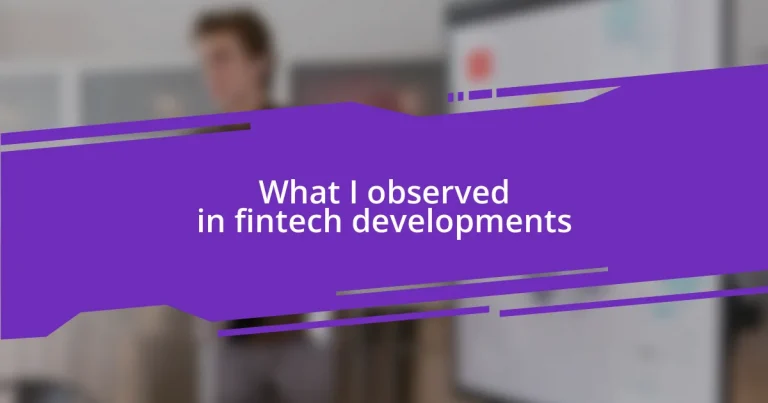Key takeaways:
- Fintech innovations, driven by AI and blockchain, are reshaping financial services, enhancing efficiency, security, and democratizing access for consumers.
- Regulatory challenges present a double-edged sword, fostering consumer protection while potentially stifling innovation; a collaborative approach is essential for growth.
- The future of fintech lies in personalized AI services, sustainable finance, and evolving regulatory frameworks that encourage innovation while ensuring consumer trust.
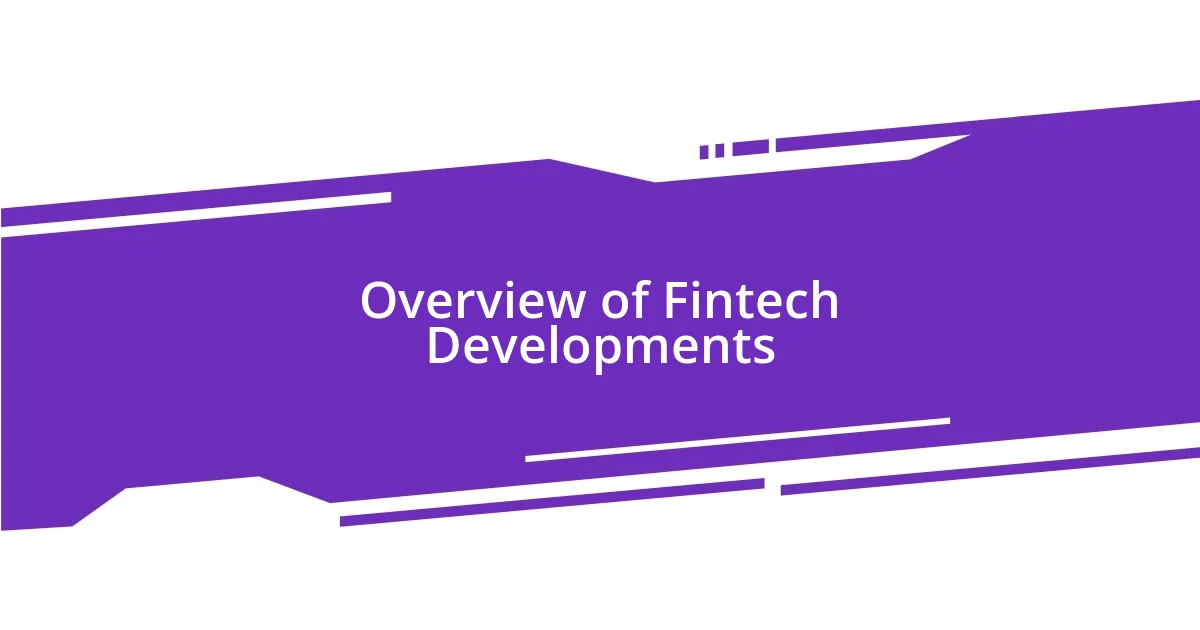
Overview of Fintech Developments
The landscape of fintech has transformed dramatically over the last few years, primarily driven by technological advancements and shifting consumer preferences. I remember when I first used a mobile payment app; it felt revolutionary. Hasn’t it changed the way we view spending and banking? The instant transactions and user-friendly interfaces really made me rethink how I manage my finances.
Emerging technologies like artificial intelligence and blockchain are reshaping the financial services industry, enhancing efficiency and security. When I first encountered blockchain technology, I was taken aback by its potential to create a decentralized financial ecosystem. It made me wonder—what would the future of banking look like without intermediaries? These innovations are not just trends; they’re paving the way for a more accessible financial system for everyone.
Moreover, the rise of neobanks and peer-to-peer lending platforms has disrupted traditional banking models, offering personalized services that cater to individual needs. I vividly recall discussing the benefits of a neobank with friends, marveling at how tailored financial solutions can empower users to take control of their finances. Have you ever thought about how inclusivity in banking could change lives? The ongoing shift towards fintech is about more than just convenience; it’s about democratizing access to financial services in ways we’ve never seen before.
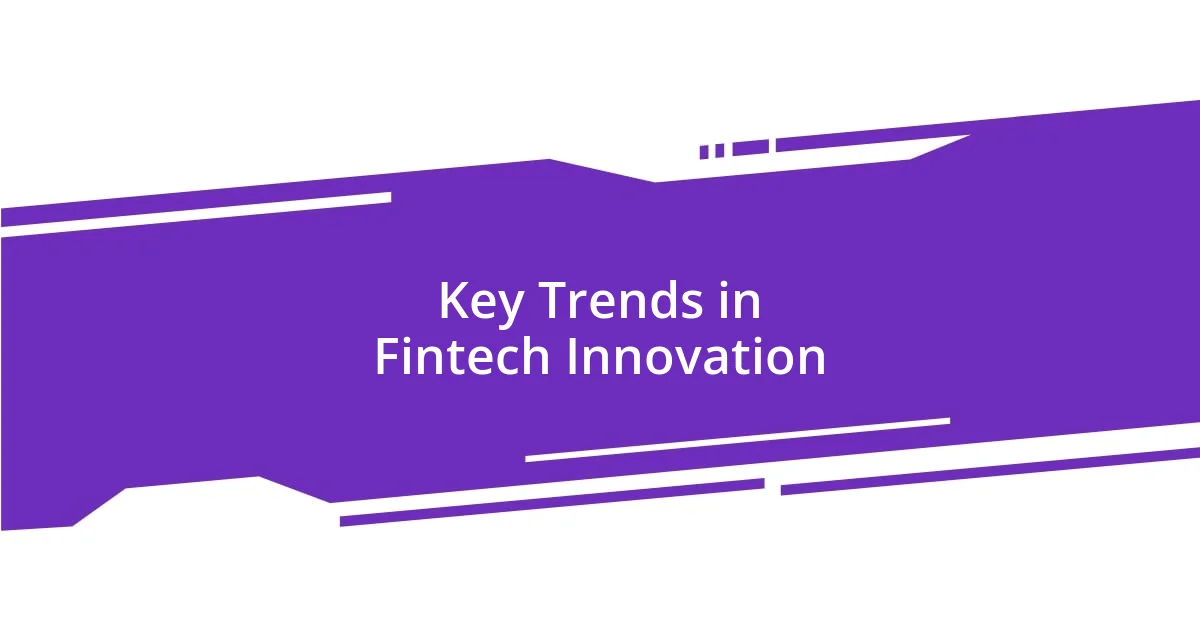
Key Trends in Fintech Innovation
The fintech space is buzzing with several key trends that promise exciting developments for the future. One trend I find particularly fascinating is the growth of Artificial Intelligence (AI) in personal finance management. When I first set up a budgeting app powered by AI, I was amazed at how it tailored suggestions based on my spending habits. It felt like having a personal financial advisor at my fingertips, making my budget not just realistic but also achievable.
Here are some of the most significant trends I’ve observed in fintech innovation:
- AI Integration: Enhancing user experiences through personalized insights.
- Blockchain Utilization: Increasing transparency and security in transactions.
- Rise of Digital Currencies: Central bank digital currencies (CBDCs) gaining traction.
- Sustainable Finance: Focus on environmentally friendly investment options.
- Embedded Finance: Creating seamless payment experiences within non-financial platforms.
Another trend I’m noticing is the surge in digital wallets and contactless payments. The other day, I used a digital wallet for a coffee run, and the convenience blew me away. In that moment, I realized how a simple tap transforms the way we think about money. It’s all about speed and security, making our daily transactions effortless. The shift towards these technologies is reshaping consumer behavior, encouraging us to embrace a cashless society fully.
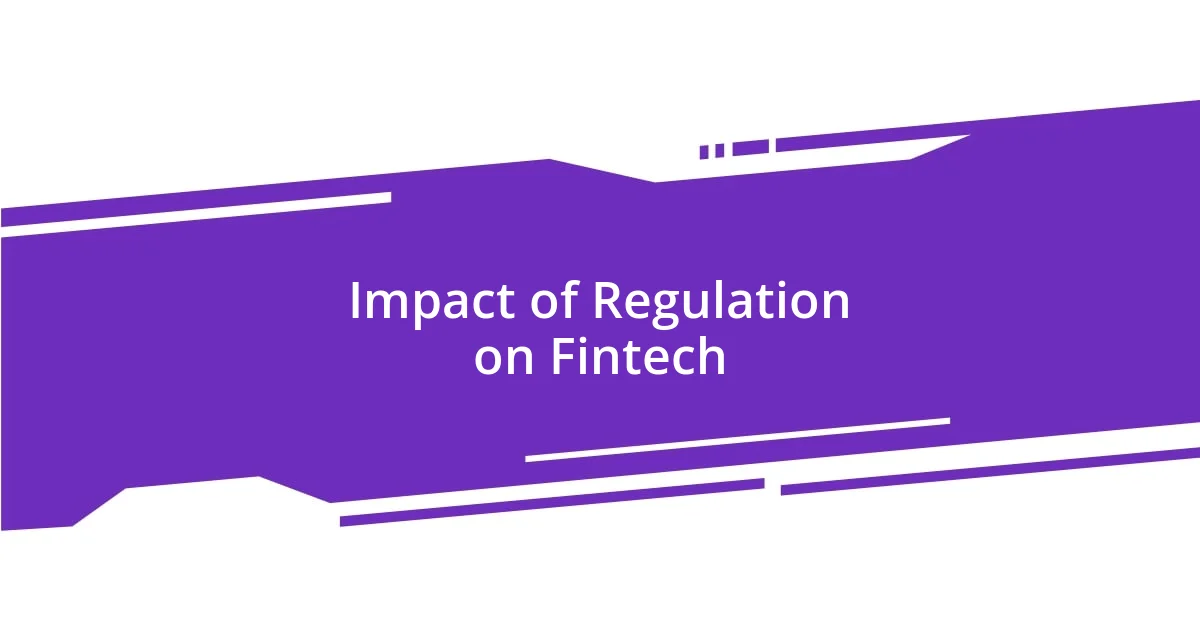
Impact of Regulation on Fintech
The regulatory landscape around fintech is evolving constantly, and that’s both exciting and daunting. From my experience, these regulations, while essential for consumer protection, can sometimes stifle innovation. I’ve seen startups grapple with compliance requirements that require resources they often lack. How can emerging companies navigate this tightrope? In my opinion, a collaborative approach between regulators and fintech firms could foster innovation without compromising on security.
Regulations also vary significantly across regions, leading to a patchwork of compliance challenges. I recall discussing this with an entrepreneur who was expanding his peer-to-peer lending platform internationally. He expressed frustration at how different countries have different rules, making scaling up a complex puzzle. It sparked a question in my mind: could harmonizing regulations across borders simplify this process? I believe that streamlined regulations have the potential to unlock opportunities, allowing companies to focus more on growth and differentiation instead of getting bogged down in red tape.
Finally, as fintech evolves, so does the need for policies to keep pace with technological advancements. I once attended a seminar where experts debated how fintech regulation should adapt to innovations like decentralized finance (DeFi). The tension between fostering creativity and ensuring stability was palpable. The discussions around this topic underscored the importance of regulators being proactive rather than reactive to changes. For me, this balance is crucial—not only for the industry’s growth but also for ensuring that consumer trust is maintained.
| Aspect | Regulatory Impact |
|---|---|
| Consumer Protection | Ensures safety, but can limit innovation. |
| Compliance Cost | Increases operational expenses for startups. |
| Global Variety | Creates complexity in international expansions. |
| Innovation vs. Stability | Highlights the need for flexible regulations. |
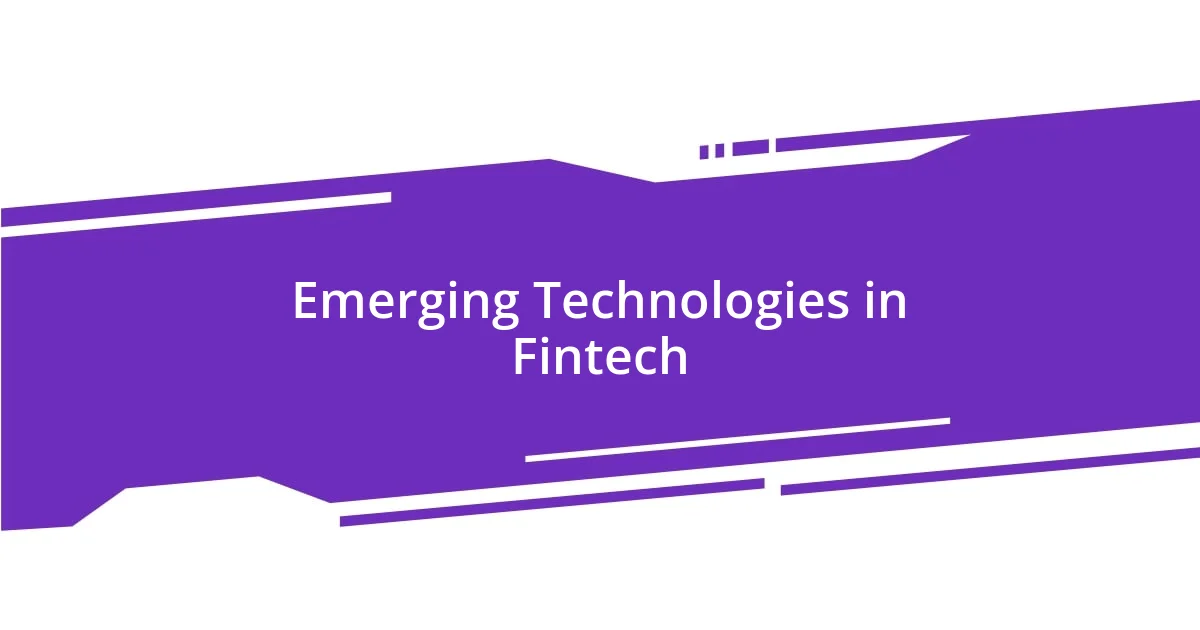
Emerging Technologies in Fintech
The advancements in blockchain technology have captivated my interest lately. I remember the excitement I felt when I first learned about smart contracts and how they automate transactions without intermediaries. This kind of transparency can drastically reduce the chances of fraud and miscommunication, transforming industries such as real estate and supply chain management. Could this be the key to building trust in financial transactions?
As I delved deeper into the realm of digital currencies, the launch of Central Bank Digital Currencies (CBDCs) stood out to me. Experiencing the buzz among financial professionals at a recent conference, I realized that these digital assets could reshape our understanding of money itself. Would a government-backed cryptocurrency make me feel more secure about my transactions? With their potential to streamline cross-border payments and enhance financial inclusion, I couldn’t help but feel optimistic about the future of currency.
I’ve also observed the rise of embedded finance, which subtly integrates financial services within non-financial platforms. Just last week, I used an app to book a trip that offered instant travel insurance as part of the booking process. The seamless experience left me wondering: have we reached a point where financial decisions are made without even realizing it? This integration highlights how technology continues to simplify our lives, making financial services more accessible and less intimidating.
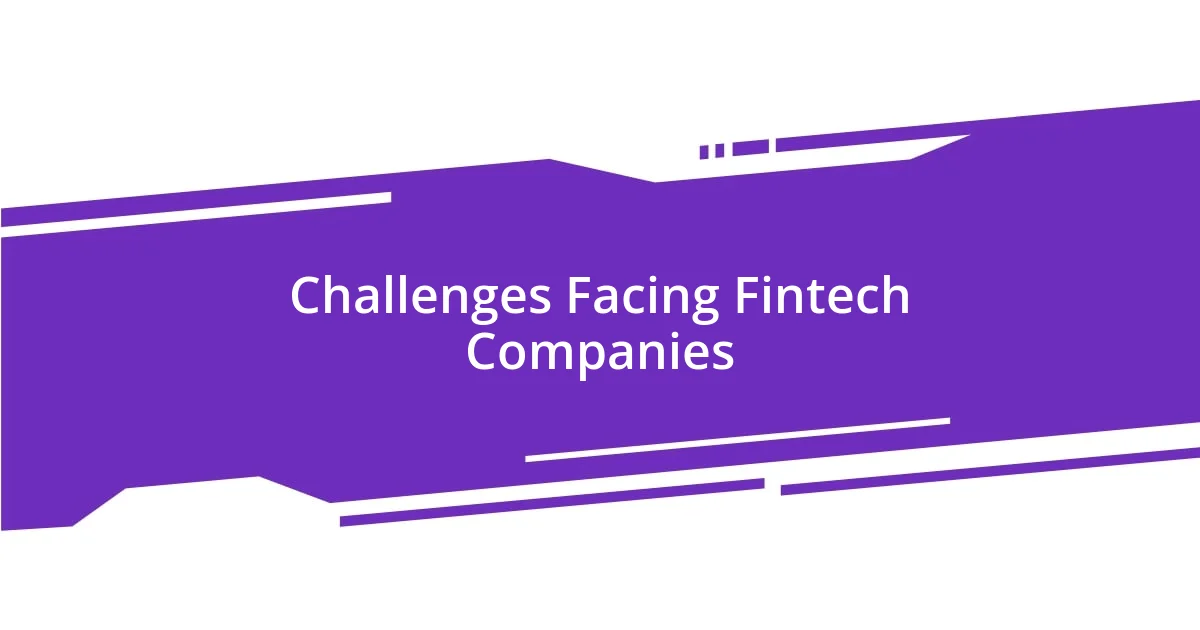
Challenges Facing Fintech Companies
Navigating the complexities of security is one of the significant hurdles fintech companies face today. I remember a conversation I had with a founder of a cybersecurity startup who described the daily battle to protect sensitive user data. The pressure is immense; a single breach can undermine consumer trust instantly. How does one maintain security without hindering user experience? It’s a delicate balance, and I often feel for those trying to manage this tightrope walk.
Another challenge arises from the rapid pace of technological change. I recently attended a webinar where tech leaders discussed the difficulty in keeping up with emerging technologies. The anxiety was palpable – many small fintechs lack the resources to continuously innovate and stay relevant. For me, it raises an important question: do we risk getting left behind if companies can’t adapt swiftly enough? In an industry known for its fast-moving nature, this need for agility cannot be overstated.
Lastly, I’ve observed that building a strong brand in the crowded fintech space is no small feat. I once chatted with a marketing director at a rising neobank who shared stories of their struggles against established players with loyal customer bases. There’s an undeniable emotional component here; trying to carve out a niche can be exhausting. It makes me wonder: what innovative marketing strategies can truly capture consumer attention in such a bustling marketplace? Turning these challenges into opportunities is essential for growth and resilience.
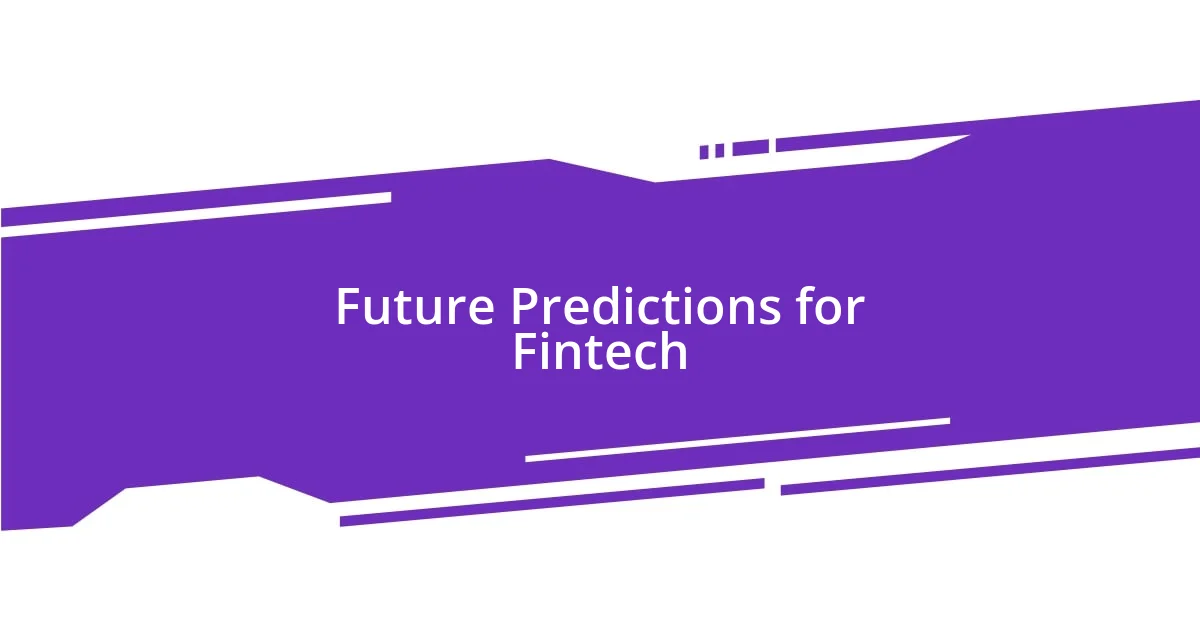
Future Predictions for Fintech
I anticipate that one of the most significant developments in fintech will be the widespread adoption of artificial intelligence (AI) for personalized financial services. Just last month, I experimented with a budgeting app that uses AI to analyze my spending habits and recommend tailored savings strategies. It felt as if I had my own financial advisor guiding me through my financial journey. Can you imagine a future where every aspect of our financial decisions is effortlessly optimized through AI? It seems like a promising avenue toward making finance not just more efficient, but also more individualized.
Looking ahead, I can’t shake the feeling that sustainability will become a focal point for fintech innovations. During a recent discussion at a sustainability summit, I was fascinated by how fintech companies are beginning to leverage their platforms to promote eco-friendly investing and transparent supply chains. I wonder, how might we redefine our financial priorities when sustainable practices become integral to our investment processes? This shift could lead to a more conscientious consumer base, prioritizing ethical considerations alongside profitability.
Finally, I see a future where regulatory frameworks in fintech will evolve to keep pace with innovation. Reflecting on a recent panel discussion I attended, it was inspiring to hear industry leaders debate how flexibility in regulations could foster innovation while safeguarding consumers. Will regulators rise to the occasion and embrace a collaborative approach with fintech companies? As these relationships develop, I sense that they will play a pivotal role in shaping a secure and innovative financial ecosystem. The path ahead is complex, but the potential for a thriving partnership between technology and regulation feels incredibly exciting.
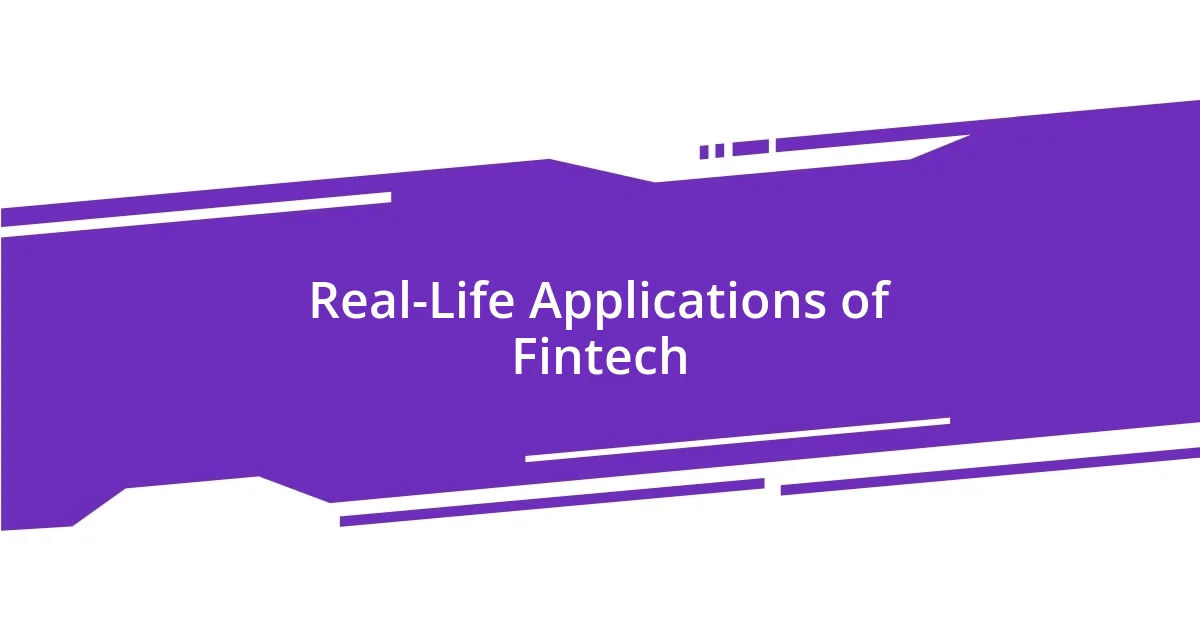
Real-Life Applications of Fintech
Fintech has become a part of my daily life in ways I never imagined. For instance, when I use a peer-to-peer payment app to split dinner bills with friends, it’s fascinating to think about how technology has streamlined something as simple as sharing costs. In moments like these, I can’t help but feel that the convenience of cashless transactions has completely reshaped social interactions. Isn’t it remarkable how something so seemingly small can change the dynamics of our everyday experiences?
Another exciting application I’ve witnessed is in the realm of investment platforms. Recently, I attended a meetup for new investors, where a speaker shared how robo-advisors can help tailor portfolios based on individual risk tolerance and financial goals. It struck me that such tools democratize investing, allowing novices to access guidance that was once only available to the wealthy. Have we reached a point where anyone can become an investor with the help of technology? The thrill of making informed decisions without needing a financial degree really highlights the transformative power of fintech.
One real-life application that deeply resonates with me is the growth of digital lending platforms. I remember speaking with a small business owner who leveraged one of these platforms to secure a quick loan to cover unexpected expenses. It was eye-opening to hear how this accessibility made a profound difference in her business operations. Does this not illustrate the democratization of credit? Through fintech, we’ve entered an era where timely financial support is just a few clicks away, which can undoubtedly change lives.












